(Devin a new tool for Software Engineering)
Table of Contents
In software development, a groundbreaking innovation has emerged from the minds at Cognition, helmed by Scott Wu. This innovation is not just another coding utility—it’s Devin, an AI-powered software engineer set to redefine the standards of software construction. Devin transcends the traditional roles of assistants or automated tools by working alongside human engineers as an equal partner, enhancing the entire development journey from the initial idea to the final deployment. In this article, we delve into Devin’s robust features and transformative impact on software engineering and consider what its existence means for the future of coders.
Devin’s Robust Toolbox: Elevating Code Craftsmanship
Central to Devin’s design is its emulation of a highly experienced software engineer’s capabilities. Let’s explore its core features:
- Coding Mastery: It is adept in several programming languages, including Python and JavaScript, enabling him to convert conceptual visions into real-world software solutions like websites and applications tailored to specific needs.
- Quality Assurance Vigilance: It approaches testing with a perfectionist’s zeal, ensuring that every piece of code operates flawlessly and fulfills its intended role.
- Deployment Agility: After perfecting the code and conducting thorough tests, Devin effortlessly deploys the product to its online destination, ready for user interaction.
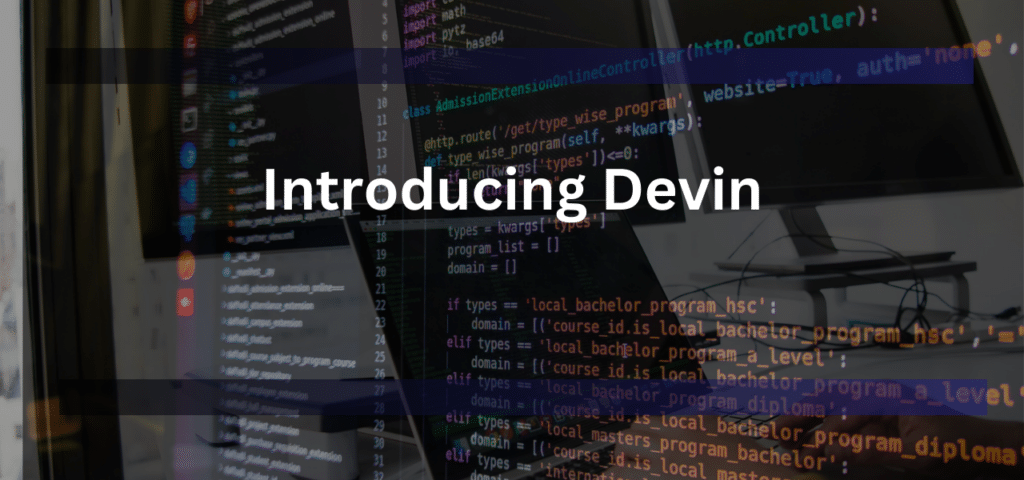
Yet, Devin’s true power lies in its sophisticated learning and adaptation mechanisms:
- Ongoing Education: Each new project enhances Devin’s knowledge, allowing it to integrate novel tech advancements and coding strategies, thus continually advancing its effectiveness and problem-solving prowess.
- Strategic Insight: Devin boasts superior planning and reasoning skills that transcend mere coding, capable of deconstructing complex projects into more straightforward segments, plotting development strategies, and selecting the most suitable solutions.
- Memory Recall: Unlike a human colleague who might overlook details, Devin retains all the critical information about a project, including goals, tools used, and previous decisions, ensuring consistency and reducing the need for reiteration.
- Self-Optimization: Through experience, Devin learns from its errors, autonomously identifies and fixes coding bugs, and constantly refines its methodology for peak performance.
- AI Training: Devin isn’t limited to its development; it can also train specialized AI models for distinct project tasks, such as generating forecasts or providing insights.
This assembly of skills allows Devin to take on the brunt of development tasks, liberating human engineers to concentrate on areas like:
- Innovative Conceptualization: While it is a powerhouse in execution, human creativity is essential for devising groundbreaking ideas and features.
- Advanced Problem-Solving: It can address intricate coding puzzles, but complex technical issues often require the nuanced touch of human problem-solving.
- Client Communication and Vision Translation: Conveying client wishes into technical blueprints is a human forte. It may excel in execution, but understanding the overarching vision necessitates human interaction.
Synergistic Dynamics: The Human-AI Partnership
Devin’s purpose isn’t to supplant human engineers but to enhance their capabilities. By automating routine coding and testing tasks. It ushers in a new tier of efficiency in software development, evident through:
- Accelerated Development Timelines: Automating repetitive tasks shifts focus to core features and innovation, hastening product launches and market introduction.
- Boosted Team Productivity: With Devin managing monotonous tasks, human engineers can tackle more intricate and mentally stimulating work, optimizing productivity and enriching the work environment.
- Barrier Removal: Devin’s user-centric design enables those with limited coding knowledge to construct basic software models, nurturing a wave of citizen developers and a more inclusive software creation community.
- New Workflow Models: AI’s integration, such as Devin’s, calls for reevaluating traditional development methods. Teams can now design unique processes that play to the strengths of both human and AI contributors, potentially leading to revolutionary software development techniques.
Peering into the Future: Reshaping the Software Development Field
Devin signals a pivotal moment in software development. While there may be apprehensions about job replacement, the real value lies in the symbiotic nature of human-AI interactions. Let’s envision some prospective futures:
- Transforming Job Roles: As AI tools like Devin gain sophistication, the role of the software engineer will likely adapt. New niches may arise, concentrating on AI team management, ethical AI usage, or expertise in human-AI interfacing.
- Skill Enhancement for the Future: Software engineers must update their skill sets, learn to collaborate effectively with AI, understand AI’s potential and limitations, and refine their communication and problem-solving abilities.
Empowering Citizen Developers through User-Friendly AI
Devin’s potential to democratize software development is significant, as it:
- Lowers Entry Barriers: With an intuitive interface, Devin enables those with minimal coding experience to create essential software, cultivating a new cadre of citizen developers.
- Promotes Innovation: As more individuals engage in software creation, Devin can unlock many new ideas and approaches, enriching the diversity and innovation of the software landscape.
- Streamlines Prototyping: AI’s assistance in foundational coding allows individuals to concentrate on quickly crafting and testing prototypes, advocating for a more agile and iterative development methodology.
However, certain limitations must be acknowledged:
- Complexity Limit: It simplifies coding, but highly complex applications still demand professional software engineers’ expertise.
- Domain Knowledge: Even with AI support, an in-depth understanding of industry-specific needs and functionalities remains crucial for crafting effective software solutions.
It serves as a conduit, enabling broader software development participation without requiring full-scale engineering expertise. This cultivates a more inclusive development environment and could catalyze a new wave of creative and innovative development.
Will Devin Replace Jobs? Forecasting the Future of Software Engineering
The advent of AI like Devin raises concerns about potential job displacement in the software development industry. Here’s a nuanced view of the possible impacts:
- Mitigating Job Displacement Risks: The demand for human insight persists as routine coding becomes more automated. The focus will pivot to higher-level skills such as creative problem-solving, intricate system design, and strategic planning.
- Human Oversight Necessity: Devin may be proficient at execution, but human supervision remains crucial for security checks, ethical AI considerations, and ensuring alignment with user needs and regulations.
- New Career Prospects: AI advancement will necessitate new skills and job roles. Experts in AI development, human-AI interaction, and responsible AI integration will become increasingly sought after.
Jobs Potentially Affected:
- Routine Coding Positions: Jobs that rely on repetitive coding, like data entry or basic website construction, may face automation through AI tools like Devin.
- Entry-Level Engineering Jobs: Novice engineering roles, which mainly involve coding and testing, might see a rise in competition as AI proves more proficient in these tasks.
The Upskilling Imperative: Adapting to Change
Software engineers must embrace lifelong learning and skill enhancement to thrive in this changing landscape:
- AI Proficiency: A solid understanding of AI’s capabilities and limitations will be essential for fruitful collaboration and maximizing AI benefits.
- Interpersonal Skills: Clear technical communication, effective team collaboration, and complex stakeholder management will grow in importance.
- Critical Thinking: With AI managing routine tasks, human engineers must sharpen their problem-solving skills to address complicated technical issues and develop innovative solutions.
A Collaborative Future, Not a Competitive One
Software engineers should view AI as an influential collaborator, not a competitor. Here’s how this partnership could shape the future:
- Enhanced Creativity: Humans provide innovative sparks, while AI facilitates execution. Together, they can open new avenues for creative problem-solving and groundbreaking software.
- Quicker Innovation: AI’s automation of repetitive tasks allows teams to dedicate more time to idea generation, exploring novel concepts, and developing advanced features.
- Cost-Effective Development: Using AI to automate tasks can lead to substantial cost savings in software projects, freeing resources for further innovation.
In summary, Devin and AI tools like it signify a monumental stride in software development. Though some jobs might transform or demand upskilling, the real promise lies in the synergy between human and AI strengths. By committing to ongoing learning and capitalizing on AI and human creativity, software engineers can propel the industry toward a future marked by rapid innovation, pioneering applications, and a more streamlined development process.
For Early Access: CliCK
Check out the website page of DEVIN AI: –
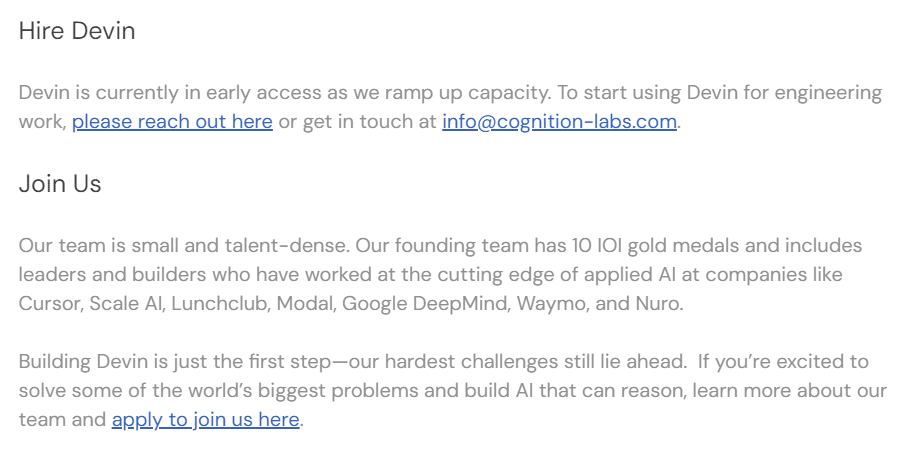
Reference :
Introducing Devin, the first AI software engineer. (n.d.). https://www.cognition-labs.com/introducing-devin

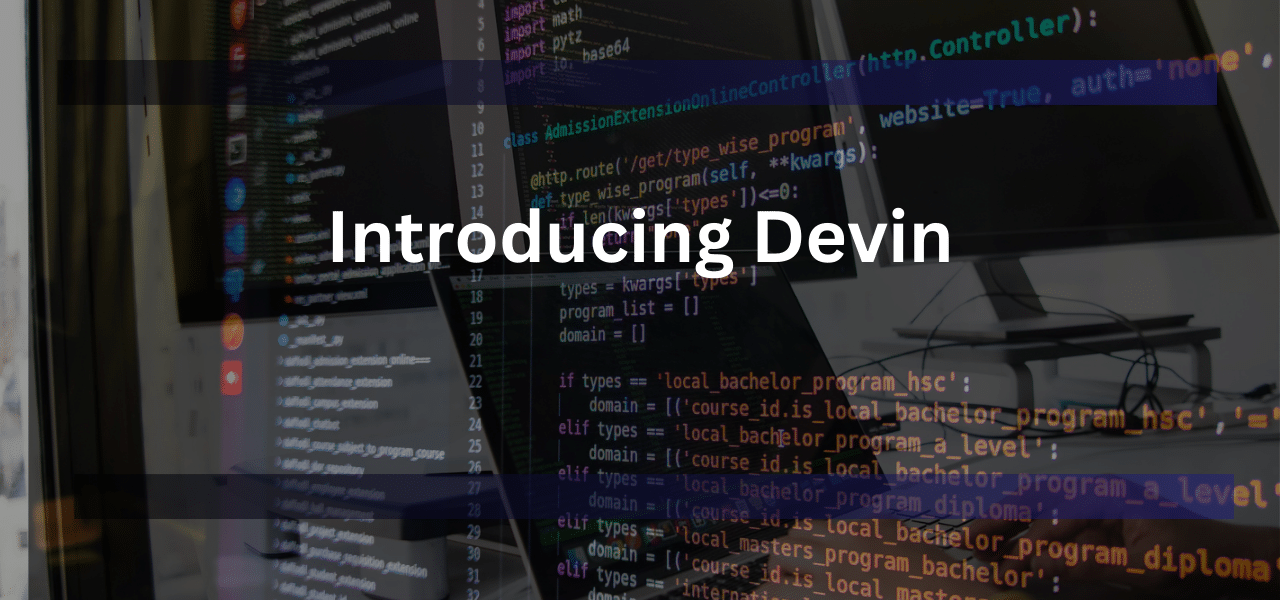
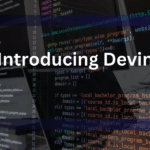

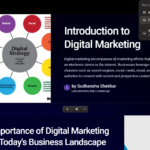

0 Comments